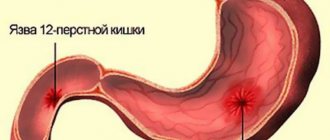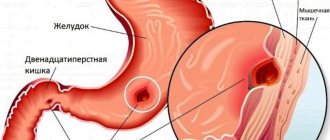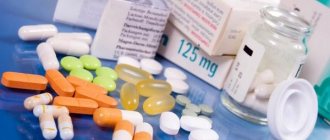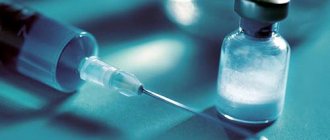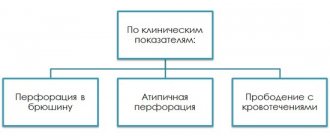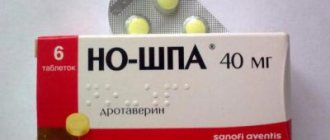What painkillers are used for ulcers?
In case of discomfort, pronounced or mild, the patient is forced to use painkillers. Often, for such pathology, the following medicinal groups are indicated:
- eliminating spasms;
- antacid drugs;
- products containing bismuth;
- analgesic medications.
Important: If a patient experiences dangerous complications in the form of a perforation of an ulcer, accompanied by acute attacks of pain, the use of any medications is prohibited. In this case, the person should immediately seek qualified help.
These pain relievers for stomach ulcers eliminate unpleasant symptoms and also have an effect on the root cause that caused the attacks of discomfort.
However, not all pain relievers can be used for the pathology in question. If you have problems with the gastrointestinal tract, it is not recommended to resort to medications belonging to the non-steroidal anti-inflammatory group. These include the following:
- Ketoprofen;
- Aspirin;
- Ibuprofen.
These drugs can quickly eliminate inflammation, discomfort and relieve fever. However, they often cause complications. It should be noted that in rare cases, non-steroidal drugs may be prescribed. However, their use is strictly controlled by the attending physician.
Analgesics for pain relief of stomach ulcers
Analgesics are drugs that have a powerful analgesic effect. There are non-narcotic pills that mask pain, these are:
Often, a doctor prescribes Baralgin to a person who has a stomach ache. This remedy has the ability to prevent the development of spasms. It is used as an injection as an analgesic for severe pain, and for less pronounced sensations, tablets are used.
Drugs in this group, as gastroenterologists warn, are allowed to be taken if the diagnosis has already been made. Analgesics should be taken only after consultation with a doctor. They are prescribed very rarely because they are destructive to the intestines and the mucous layer of all digestive organs.
Effective painkillers for high acidity
What painkillers can you take for a stomach ulcer if the acidity is high? First of all, excessive secretion production provokes an increase in acid levels. This leads to the patient beginning to feel discomfort of a burning nature, accompanied by heartburn.
To eliminate such a feeling, you can only overcome the root cause that caused the appearance of unpleasant symptoms. Often, increased acidity is a concomitant symptom of gastritis. In this condition, the use of antacids is indicated. A similar pain reliever for gastritis has the following effect:
- help break down food and neutralize the effect of hydrochloric acid;
- reduces the activity of peptins;
- has an enveloping effect on the mucous membrane;
- increase the production of prostaglandins;
- has a good analgesic effect.
To normalize acidity, a gastroenterologist may recommend one of two antacid medications:
- Rennie or Tams;
- magnesium oxide.
This group of drugs is quickly absorbed and produces almost immediate positive results. However, such means also have disadvantages. Their effect is short-term, sometimes it is possible to increase blood pressure and increase belching. Therefore, before using this drug, you need to consult a doctor.
But the second category of antacid drugs, on the contrary, is not absorbed and neutralizes the negative effects of acid for a long time. At the same time, the acid-base balance remains unchanged. This group includes the following tools:
- Almagel;
- Maalox.
Important: A patient often experiences a feeling of discomfort after overeating. Because the stomach is sensitive to the slightest change. Therefore, it is recommended to eat food in small portions and more often.
Painkillers are prescribed for gastritis and ulcers. They relieve spasms, cover the gastric mucosa with a protective film and improve the patient’s overall well-being.
How to relieve stomach ulcer pain
Due to the complexity of the disease, many are interested in the question of what painkillers can be taken for stomach ulcers.
Advice! You cannot take medications on your own without consulting a doctor to relieve pain.
For stomach ulcers, the following groups of painkillers can be most often prescribed to relieve symptoms of abdominal pain:
- Bismuth preparations, which form a protective film at the site of ulcer formation, thereby eliminating the negative effects of irritating factors.
- Analgesics that block nerve impulses.
- Antispasmodics that relax smooth muscles, which helps relieve spastic muscle contractions that cause pain.
- Antacids that neutralize hydrochloric acid, which is an irritant for inflamed mucous membranes.
In addition, if other painkillers are ineffective, anticholinergics or ganglion blockers can be used. They are able to block sensitive receptors, but at the same time impair motility and secretion of the digestive organ. There are many contraindications for these medications.
Analgesics
The widespread use of analgesic drugs for ulcers is explained by the fact that thanks to them it is possible to quickly relieve pain. But doctors avoid prescribing painkillers. This is due to the fact that the drugs not only have a negative effect directly on the digestive organ, but also have a detrimental effect on the mucous membranes of all organs of the digestive system.
The most commonly prescribed drug to drink is Spazmalgon. Preference is given to injections. This allows you to minimize the risks of increased inflammation. If the pain caused by a stomach ulcer is insignificant, then to quickly relieve discomfort it is allowed to occasionally use analgesics in tablet form.
Advice! In special cases, the drug can be taken with an 8-hour break to prevent the occurrence of hunger pains.
Also, other non-narcotic drugs in injections or tablets that mask pain can be prescribed for pain relief, these are:
- Ibuprofen, which has a quick effect.
- Baralgin, which is compatible with other drugs.
- Buscopan, which has no side effects.
Antispasmodics
Antispasmodics must be taken to relieve pain caused by an exacerbation of the disease. The thing is that during acute inflammation, muscle spasms of tissue occur, which leads to pain.
Drugs of this type relax smooth muscles, thereby stabilizing the patient's condition. The most famous representative of antispasmodics is No-Shpa. It has a long-lasting effect thanks to the main active ingredient - drotaverine. No-Spa is not dangerous to the stomach, so it can be used not only as intramuscular injections, but also in tablets.
Another popular drug that has an antispasmodic effect is Papaverine. This drug is considered less effective in comparison with No-Shpa. In addition, the strength of the drug remains for a short time. Papaverine is convenient because it is available in three forms:
- Tablets.
- Injections.
- Candles.
Bismuth preparations
For stomach ulcers, medications containing bismuth are very effective in relieving pain. The analgesic properties of drugs are explained by the formation of a stable protective film on the inflamed mucous membrane.
This reduces the negative impact of food, which is an irritant. Thanks to the presence of a protective film, rapid restoration of the mucous membrane and scarring of the ulcer occurs.
An important feature of drugs in this group is their ability to fight the bacterium Helicobacter pylori, which is one of the main causes of the disease.
The most famous bismuth-containing drug is De-Nol. The product is highly effective and safe. The drug is available in tablet form.
Taking De-Nol is allowed only on the recommendation of a doctor and in accordance with the instructions for use. The main contraindication for the medicine is individual intolerance to the active substance.
Antacids
Antacids are always included in the treatment regimen for stomach ulcers that arise against the background of the development of gastritis. These pain relievers help relieve the discomfort associated with heartburn, which is a common symptom of the disease.
Drugs in this group neutralize hydrochloric acid, which causes an exacerbation that provokes pain. The most popular medications are:
- Almagel A, release form - suspension. Thanks to the main active ingredients of magnesium hydroxide and aluminum hydroxide, the product has enveloping, absorbent and cytoprotective properties. This soothes the inflamed mucous membrane, and due to the presence of anesthesin in the composition, the analgesic effect is enhanced.
- Rennie, release form - tablets. The main active ingredients in the drug are magnesium and calcium carbonate. Thanks to them, the feeling of heaviness in the stomach is eliminated, hydrochloric acid is neutralized, which results in rapid pain relief. Due to the absence of contraindications, the drug can be used even during pregnancy.
Folk remedies
There are many folk remedies that can quickly relieve pain at home. An excellent pain reliever for stomach and duodenal ulcers is milk with honey.
To prevent pain, a glass of warm milk should be diluted with a small amount of honey and drunk half an hour before meals. Such a tasty drink can neutralize hydrochloric acid, which will begin to be produced during food intake and have an irritating effect.
If there are contraindications for milk or there are allergic reactions to honey, then the drink can be replaced with sea buckthorn oil. It should be taken in small quantities an hour before meals. Traditional healers claim that this method can speed up the scarring of ulcers.
You can relieve pain with an infusion of medicinal herbs: mint, St. John's wort and chamomile. Also an effective folk remedy for relieving spasms is plantain juice or an infusion of dry leaves of the plant.
Because there are so many options for pain relief, you should consult your doctor before using a specific medication. Any self-medication is very dangerous. If you experience severe abdominal pain due to a stomach or duodenal ulcer, you should urgently call an ambulance.
Recommended medications for low acidity
Acid deficiency may also cause pain. In addition to discomfort, the patient will experience bloating and heaviness in the stomach. In this condition, nicotinic acid is effective. This substance normalizes the functioning of the center responsible for the production of hydrochloric acid. Therefore, in cases of low acidity, medications containing nicotinic acid are prescribed. The most effective group includes antispasmodics. eliminating spasms and severe discomfort:
- Papaverine in the form of hydrochloride. Most often used for gastritis with low acidity;
- No-spa is also irreplaceable for ulcers;
- medicine Baralgin.
Important: No-spa is considered the most popular drug approved for use by expectant and nursing mothers. The main active ingredient of No-shpa is drotaverine, which quickly relieves spasms.
Analgesics are sometimes indicated to raise and normalize acidity levels. Such drugs have a powerful analgesic effect. In turn, analgesics are usually classified into two categories: non-narcotic drugs and drugs containing narcotic substances. The latter are prescribed for callous ulcers that transform into a malignant formation. Such painkillers for stomach ulcers are indicated in severe cases. More often, Morphine, Promedol and others are prescribed to relieve severe pain attacks.
Antispasmodic painkillers
The main painkillers for stomach ulcers are antispasmodics. They relieve spasms, which cause attacks of sharp and periodic pain. Directly, medications in this group eliminate the discomfort of peptic ulcers. After taking them, smooth muscles relax, but we must keep in mind that they have a hypotensive effect.
The most famous representative of this group is No-shpa with the active ingredient drotaverine. Thanks to its action, spasms of blood vessels and smooth muscles disappear for a long time, as a result of which a person gets rid of pain. No-shpa can be drunk by pregnant and lactating women. It is available in the form of tablets and injections.
There is also such an anesthetic as Papaverine, where the main active ingredient is papaverine hydrochloride. Today it is used infrequently, because its effect is not pronounced, and the effect is not as long-lasting as other drugs. The medicine stands out in that you can choose the best form for yourself:
Popular painkillers
For duodenal ulcers, non-steroidal anti-inflammatory drugs are often prescribed. Such medications have a gentle effect and quickly eliminate the resulting spasms. Commonly prescribed ones include the following:
- Sedalgin;
- Nimesil;
- Tempalgin;
- Spazgan.
Important: The use of painkillers should be carried out in combination with antibiotics. This will help to get a lasting positive effect. Because therapy consisting of painkillers alone gives only short-term results.
This group of medications relieves spasms. Injections are used for severe pain. In cases where the discomfort is moderate, the use of tablets or other more gentle means is indicated.
Symptoms of a perforated duodenal ulcer
Stitching or cutting pain in the upper abdomen indicates the presence of an exacerbation of the ulcer. The disease begins with a pulling sensation in the pit of the stomach, severe hunger in the morning and nausea. After the symptoms of a duodenal ulcer are identified, treatment with drugs will help relieve pain and eliminate the inflammatory process.
The body of patients with peptic ulcer constantly sends signals to the person. You need to pay attention to the following symptoms:
- abdominal pain;
- appetite disorder;
- vomit;
- nausea;
- heartburn, belching.
Pain develops 1.5 hours after eating. Also sometimes there are so-called hunger pains. An ulcer sufferer often experiences a sucking painful sensation in the right hypochondrium, as well as acute hunger. The pain can be of different types and any intensity. Often the pain radiates to the back. Painful sensations are caused by a violation of the integrity of the intestinal mucosa, as well as by the inflammatory process.
Most membrane lesions are accompanied by heartburn and unpleasant belching. This is due to the uptake of oxygen into the esophagus. The stomach contains an acidic environment. When gastric motility is impaired, inflammatory changes in the mucous membrane of the organ develop.
duodenal ulcer
Nausea and vomiting are characteristic signs of an ulcer. As complications develop, vomiting with the presence of bile may be observed. Secondary inflammation of the pancreas occurs. A diseased stomach does not cope well with digestion, so ulcers are characterized by constant nausea.
Danger of peptic ulcer, possible complications
Complications arise when the ulcer is not diagnosed in a timely manner. Complications in medicine are divided into destructive (which destroy the intestine) and dysmorphic (which change the biostructure of the organ). Most often observed:
- destructive bleeding;
- perforation;
- penetration into a neighboring organ of inflammation;
- pathological changes in the structure of the walls;
- narrowing of the lumen.
How to treat a duodenal ulcer in case of complications - your doctor will tell you. The prescription of therapy depends on the nature of the complication and the intensity of the symptoms. Bleeding can be caused by heavy lifting, stress, and physical labor. Often, drinking alcohol can cause severe blood loss. Patients with peptic ulcer disease require treatment in a hospital setting.
Important! When bleeding, the stool becomes dark in color and resembles tar. Sometimes bleeding from an ulcer is manifested by pasty stools or diarrhea. Blood loss is often accompanied by vomiting and weakness.
When perforation occurs, bleeding and irritation of the abdominal cavity occur. Intestinal contents, bile and pancreatic enzymes enter the abdominal cavity. An aggressive environment has an extremely negative effect on the membranes of the peritoneum. Peritonitis develops and severe acute pain is felt in the abdomen. For duodenal ulcers, treatment with appropriate medications eliminates these symptoms.
After a few hours, the pain may subside a little. However, after a while the patient’s condition worsens sharply:
- the stomach is bloated;
- temperature rises;
- pulse and heart rate increase;
- vomiting is observed.
When the intestinal lumen narrows, a deep scar appears, making it difficult for food masses to pass through. In this case, surgical intervention is required.
Video symptoms of duodenal ulcer
You can clearly see the exacerbation of an ulcer in videos that are widely available on the Internet. The video material clearly shows how a peptic ulcer develops. Next comes severe tissue damage and inflammation of the intestinal mucosa. An imbalance develops between stomach acid and pepsin. The muscles of the stomach stop functioning normally.
Some doctors believe that the cause of peptic ulcers is the bacterium Helicobacter pylori. The microorganism attacks the cellular structures of the organ. Helicobacter can often be found in feces. Pathogenic flora provokes the release of large amounts of acid, which primarily irritates the gastrointestinal mucosa. An aggressive environment promotes the release of cytokines, which damage cellular structures and stimulate the release of gastrin.
Antispasmodics
In case of a stomach ulcer during an exacerbation, antispasmodic medications are a good help in coping with pain. These drugs are prescribed to directly block the spasm, which is the cause of discomfort. The following painkillers are considered popular:
- Spasmomen;
- Dicetel;
- Buskopan.
Important: For ulcers, gastritis and colitis, doctors recommend taking Spazmalgon or Nosh-pu as an emergency treatment. These drugs quickly relieve spasms. At the same time they act gently.
Painkillers are required in therapy. Despite the fact that such drugs are available without a prescription, they must be prescribed by a doctor. It is important to remember that if you have a stomach or duodenal ulcer, you should be careful when choosing painkillers. Since some drugs can only worsen the patient’s already dangerous condition. Therefore, you should not conduct experiments on your own body, in patients with ulcers.
Painkillers for stomach or duodenal ulcers
Painkillers for gastric ulcers or duodenal ulcers are prescribed empirically and exclusively by a doctor with the utmost caution. It is especially important to take a balanced and scrupulous approach to the selection of drugs for pain relief.
The fact is that many painkillers are contraindicated specifically for gastrointestinal ulcers. For example, the familiar “Analgin” and “Ketanov” are prohibited for peptic ulcers.
As a result, the patient is prescribed to drink mainly anti-spasm drugs, which are not particularly effective, especially in severe forms of the disease.
The following medications are often prescribed for pain relief for peptic ulcers:
- No-shpa (in tablets and injections);
- Spasmomen (only in tablets);
- Buscopan (in tablets and suppositories);
- Baralgin (in tablets and injections);
- Papaverine (in tablets, suppositories and injections).
Non-steroidal anti-inflammatory drugs are strictly . Despite their high effectiveness in relieving pain, in peptic ulcers they very often cause bleeding (including massive bleeding). You should not drink them both in acute and chronic forms of the disease.
Let us repeat that the selection and use of medications to relieve pain in diseases of the gastrointestinal tract is carried out only with the assistance of a gastroenterologist. Self-prescription of such drugs often causes serious complications and even deaths.
How can you relieve pain from an ulcer?
When pain occurs due to a peptic ulcer of the stomach and, accordingly, the duodenum, the first thing that arises in patients is the thought of how to relieve an attack of pain. And what is important here is an adequate and safe way to reduce pain intensity, since choosing the wrong drug can worsen the situation.
If we talk about medications that help relieve pain from ulcerative lesions of the stomach and duodenum, then the choice should be made only from the following types of drugs:
- Anticholinergics: the best option would be Platifillin and Gastroceptin.
- Antispasmodics: the drugs of choice are No-Shpa and Metacin.
- Gaglioblockers: the drug “Quateron”, “Dicalin” and “Benzohexonium”.
- Bismuth preparations: “De-Nol”, “Bismol”, as well as “Ventrisol” and “Tribimol”.
- Antacids (they can relieve not only pain, but also heartburn): “Almagel”, “Maalox”, as well as “Vikalin” and “Phosphalugel”.
A glass of milk works well as a non-medicinal remedy. However, it is important to understand that not all patients with peptic ulcers can drink milk.
It should be noted here that in general, all of the listed remedies for pain due to ulcerative pathology can be taken only after consultation with a doctor. If you have an ulcer, you need to find out in advance from your doctor about the type of disease and which analgesics are indicated for it.
Otherwise, there is a statistically high risk of developing complications, including dangerous ones (for example, massive ulcerative bleeding or perforation). Moreover, sometimes so-called heart pain, which is also localized in the upper abdomen, can be mistaken for ulcer pain.
Group of antacid medications
For gastrointestinal diseases, the complex of therapeutic measures is supplemented with antacids. These remedies not only remove negative symptoms, but also fight the root cause. Therefore, antacids are indicated for the following pathologies:
- for gastritis with high acidity;
- with reflux pathology. If discomfort begins to bother you due to excessive secretion production, which is thrown back into the esophagus and accompanied by heartburn.
Antacids contain the following substances:
- soda;
- aluminum hydroxide;
- calcium carbonate.
These components, once in the gastric environment, neutralize increased acidity. Due to which the patient feels relief.
As for the most popular antacids, these include Phosphalugel, Enterosgel and Almagel. These products simultaneously have a complex of effects: they envelop and disinfect the mucous membrane, neutralize excess acids, relieve inflammation, and eliminate pain and heartburn.
If the pain is pronounced, the doctor prescribes chronolytics in the form of Atropine or Metacin. Such medications should be used with caution, strictly following the instructions.
Eliminates heartburn
With stomach and duodenal ulcers, the patient often suffers from heartburn. To eliminate it, medications belonging to the category of proton inhibitors are prescribed. It is recommended to use such medications to get rid of heartburn and restore damaged mucosal tissue.
Inhibitors work at the cellular level, suppressing the secretory function responsible for the release of hydrochloric acid. At the same time, the products protect the walls of the mucous membrane from acidic action and initiate digestive renewal processes.
Among the widely used blockers are the following:
- Nolpaza;
- Omeprazole;
- Lansoprazole.
Important: Use of any drug, even the most harmless at first glance. must be agreed with a gastroenterologist. It is important to understand that an ulcer is a dangerous defect that can be fatal.
This group quickly relieves severe pain that antacids cannot cope with. In addition, blockers act on the root cause that provoked the unpleasant symptoms. These include gastritis, ulcers and esophageal reflux. At the same time, by combining inhibitors with antibiotics, therapy becomes more effective for chronic illnesses.
Groups of painkillers for the stomach
Nonsteroidal anti-inflammatory drugs based on acetylsalicylic acid, ibuprofen and diclofenac are prohibited for abdominal pain. Their uncontrolled use can lead to gastritis, duodenal or stomach ulcers. The following are allowed for stomach pain:
- Antacids. These drugs not only relieve abdominal pain, but also treat the cause of its occurrence. They are alkaline, so they interact with the acidic environment of the stomach.
- Antispasmodics. This is the most common group of painkillers for the stomach, the action of which is aimed at relieving spasms of smooth muscles.
- Proton pump blockers. They act at the cellular level, block the synthesis of hydrochloric acid by parietal cells, protecting them from an acidic environment.
- Histamine receptor blockers. These drugs stabilize the production of prostaglandins, gastric mucus, pepsin and bicarbonates.
- Bismuth-containing preparations. Their main purpose is to treat ulcers. This group of drugs exhibits bactericidal activity against Helicobacter pylori.
Antacids
The effect of antacid drugs is to neutralize the acidity of gastric juice and coat the mucous membrane. This helps relieve pain, eliminate heartburn and activate recovery processes. Modern antacid medications contain aluminum and magnesium salts, which increase the effectiveness of these medications. Their main advantage is the minimum of contraindications:
- renal failure;
- individual intolerance to individual components.
The last contraindication concerns magnesium oxide, calcium carbonate, aluminum hydroxide, sodium bicarbonate. These substances are classic active components of antacids. Preparations based on them are used to treat:
- gastritis with high acidity;
- reflux disease, in which stomach contents flow back into the esophagus.
Another advantage of antacids is their local effect. These drugs are not absorbed into the systemic circulation, which is why they have virtually no side effects. Some antacids are capable of adsorbing toxins, so such tablets for stomach pain are also used in cases of food poisoning. Effective drugs in this category are:
- Phosphalugel;
- Rennie;
- Gaviscon;
- Almagel;
- Rutacid;
- Maalox;
- Enterosgel.
Antispasmodics
These are painkillers for gastritis and stomach ulcers. Additionally, antispasmodics help eliminate unpleasant symptoms of gastroesophageal reflux. The main effect of such drugs is to regulate the contractile function of muscles, which helps eliminate their involuntary spasms. This effect is achieved in different ways depending on the type of antispasmodics used:
- Neurotropic. They act on nerve impulses and stimulate muscle function. Suppression of spasm is due to blocking the pain signal. Neurotropic antispasmodics are M-anticholinergics: Methocinium, Hyoscyamine, atropine sulfate, Buscopan.
- Myotropic. They influence biochemical reactions inside muscle cells, which also provides relief from spasms. Papaverine, Spasmomen, Trimedat, Papazol, Drotaverine, No-shpa have this effect.
Antispasmodics for the stomach include both pharmacological tablets and herbal remedies. The latter contain extracts of medicinal herbs: chamomile, oregano, tansy, lily of the valley, mint, belladonna. Both groups of drugs have minimal contraindications:
- enlarged colon;
- certain types of colitis;
- microbial intestinal diseases;
- tuberculosis;
- Crohn's disease.
Proton pump blockers
Proton pump inhibitors or blockers help relieve heartburn. This effect is due to blocking the secretory function of the parietal cells of the stomach, which produce hydrochloric acid. After taking proton pump inhibitors, the processes of regeneration of the digestive system function are started. Additionally, these drugs protect the mucous membrane from high acidity. They are used as pain relievers for stomach ulcers, gastritis, and esophageal reflux. Popular among proton pump blockers are:
- Omeprozole;
- Nolpaza;
- Pantoprazole;
- Lansoprazole.
When treating chronic ulcers, they are more effective in combination with antibiotics. After taking proton pump inhibitors, disorders of the visual analyzer are possible, which is often manifested by a decrease in visual acuity. Possible muscle pain, depression, changes in the leukocyte formula. Proton pump blockers have a minimum of contraindications:
- pregnancy;
- lactation;
- malignant tumors of the digestive tract;
- liver and kidney failure;
- gastrointestinal infections.
Histamine receptor blockers
Another name for these drugs is H2-histamine receptor antagonists. They reduce acidity levels, which helps eliminate pain. The action is due to blocking receptors on the surface of cells in the gastric mucosa. Additionally, histamine receptor blockers increase the production of prostaglandins and mucus, which has a beneficial effect on digestion. This group of painkillers for the stomach includes:
- Ranitidine (Zantac, Ranisan, Gistac);
- Nizatidine (Axid);
- Roxatidine (Roxane);
- Famotidine (Famosan, Kvamatel);
- Cimetidine (Cinamet).
Most of these medications must be taken 2 times a day - morning and evening. Histamine receptor blockers are tablets for pain in the stomach and pancreas. The disadvantage of these medications is that they do not effectively suppress the production of gastric juice, which is why the pain syndrome may return. In addition, histamine receptor blockers cause fatigue, vertigo and headache. The list of contraindications to these drugs includes:
- age up to 14 years;
- lactation;
- pregnancy;
- cirrhosis of the liver;
- disorders of the liver and kidneys;
- hypersensitivity to the composition of the drug.
Bismuth-containing preparations
The peculiarity of bismuth-containing painkillers for the stomach is the presence of a bactericidal effect against Helicobacter. These microorganisms cause inflammation of the mucous membrane, which can lead to ulceration. In addition to analgesic, bismuth-containing drugs have an anti-inflammatory effect. Examples of such drugs are:
- De-nol;
- Vikalin;
- Vikair;
- Vis-nol.
- Clavicle fracture - first aid. Bandages for clavicle fractures, treatment, recovery and rehabilitation
- Using black cumin oil: instructions and reviews
- How to boost immunity for a 3 year old child
Bismuth preparations affect the pathogen at the cellular level: they prevent the colonization of Helicobacter and reduce the symptoms of gastritis and ulcers. Such medications for stomach pain have an astringent effect, i.e. envelop the mucous membrane with a protective film. This blocks pain and prevents the occurrence of erosions and ulcers. Contraindications to the use of bismuth-based products are:
- allergy to the composition of medications;
- lactation;
- pregnancy;
- renal failure.
Histamine blockers
What drugs are most often prescribed to eliminate peptic ulcers? Therapy aimed at treating the disease in question consists of a whole range of medications, including histamine blockers. Such medications have an antisecretory effect. They block excess release of hydrochloric acid. And at the same time they stabilize the production of the following substances:
- pepsin;
- stomach mucus;
- prostaglandins.
Medicines of this class have a quick and long-lasting effect. In addition, histamines normalize the gastric environment and reduce the negative effects of acid. As for popular drugs, these include the following:
- Ranitidine;
- Nizatidine;
- Roxatidine.
These blockers suppress the excessive secretion of hydrochloric acid and pepsin, and also normalize the pH level. But, it should be remembered that the use of such medications should be carried out strictly according to the instructions and as prescribed by the gastroenterologist. Ranitidine, Nizatidine and Roxatidine are potent drugs that have a number of contraindications. In addition, they are not suitable for systemic use.
Bactericidal medicines based on bismuth
These analgesic drugs have a pronounced bactericidal effect against microbes that cause ulcer formation. In addition, bismuth preparations can simultaneously relieve pain and relieve inflammation. Bactericidal agents work as follows:
- block further development of Helicobacter bacteria;
- reduce unpleasant symptoms;
- have a positive effect as a gastric analgesic.
Among the most popular are the following:
- Vis-nol;
- De-nol;
- Vikalin.
Bactericidal drugs, entering the intestinal tract, envelop the wound areas. This allows you to relieve inflammation and eliminate discomfort.
Gastroprotectors and ganglion blockers
For gastrointestinal pathologies, ganglion blockers are rarely prescribed, provided that other drugs have proven ineffective. Gangioblockers block the motor and secretory functions of the stomach. Such an effect can relieve a person of severe pain.
Among the frequently used ganggioblockers, Dimecoline stands out. It has an anesthetic and antispasmodic effect on the vascular system. Due to this, it is prescribed for severe discomfort caused by ulcerative formation.
As for gastroprotective medications. Such medications are indicated for the uncomplicated pathology in question. Venter tablets are considered popular. After their use, the mucous membrane is covered with a layer that protects from the effects of hydrochloric acid and food enzymes.
Phyto pharmacy
Severe discomfort caused by ulcerative formation can be quickly relieved not only by medication, but also by using traditional methods. One of the most effective is considered to be a milk-honey drink, as well as herbal decoctions.
To relieve intestinal pain, you can drink a glass of warm milk with a teaspoon of acacia honey. Drink this liquid 30 minutes before meals. Milk-honey drink reduces gastric acidity and relieves discomfort.
In addition to milk, they also resort to herbal decoctions from plants such as:
- peppermint;
- chamomile;
- St. John's wort;
- elecampane;
- plantain.
A herbal mixture of plantain, elecampane and St. John's wort is especially useful. The raw materials of these herbs are poured with water and simmered over fire. Then, the prepared liquid is allowed to brew and consumed strained.
Regarding the course of treatment, method of preparation and frequency of use, it is better to consult your doctor with such questions. Such decoctions should be used only in consultation with a specialist and should not be self-medicated.
When painkillers are contraindicated
First of all, the drugs described above can only be used as prescribed by a specialist. All information provided is for informational purposes only and cannot serve as a guide to self-medication. It is important to remember this and not ignore the recommendations of the gastroenterologist.
In some conditions, the patient is strictly prohibited from using antispasmodics, blockers and astringents:
- if the patient has an enlarged large intestine;
- with colitis;
- if the intestines are infected with microbes;
- Crohn's pathology;
- tuberculosis.
During the period of bearing a child, expectant mothers are prohibited from taking antispasmodics. In this condition, medications that have a gentle effect are individually selected for the patient.
In addition, strong painkillers are not recommended for patients whose professional activities involve precision machinery and vehicle control. Such medications can inhibit psychological reactions and have a negative effect on coordination.
Summarizing the above, it should be emphasized that a person suffering from severe stomach problems needs to visit a gastroenterologist. Only a competent specialist will be able to recommend adequate therapy after conducting an examination and identifying the root cause that caused the unpleasant symptoms.
